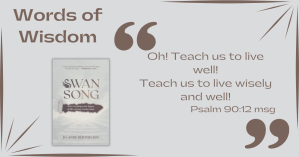I am sure I used to be calmer under pressure. When put on the spot, I could usually manage to string together a few words that kind of made sense. But these days, I sometimes find such scenarios a little more challenging. If I am not careful, my brain can seize up and I can lose the thread of what I truly wanted to say.
Take being interviewed on radio, for instance, when I do not know what the next question will be – something I have experienced three times in recent weeks in connection with my latest book, Swansong. Thankfully, such interviews are often pre-recorded, which reassures me a little and also gives the presenter leeway to cut out anything later. Yet, I found it quite a challenge each time as I sat at my desk, talking with a gentleman I had never met via video or phone and hoping my responses to his questions made sense.
When Jesus himself spoke anywhere while on earth, especially when challenged in the heat of the moment, he did not hesitate. Whatever the risk, he spoke out with such clarity and authority – the authority given to him by his heavenly Father. On one occasion, Jesus explained this again to his disciples when seeking to comfort and reassure them who he was and where he was going:
Don’t you believe that I am in the Father, and that the Father is in me? The words I say to you I do not speak on my own authority. Rather, it is the Father, living in me, who is doing his work. John 14:10
Earlier on in his ministry too, when sending his twelve disciples out, Jesus gave them authority to heal and drive out demons but also warned them in no uncertain terms what would happen when challenged:
But when they arrest you, do not worry about what to say or how to say it. At that time you will be given what to say, for it will not be you speaking, but the Spirit of your Father speaking through you. Matthew 10:19–20
Now I am definitely not Jesus. And, as far as I know, I am not about to be arrested for anything I might say during a radio interview about my latest book! Yet, in those moments when I too may grope for words to express what is in my heart, I am so grateful that, if I focus on God, even for a brief moment, I am reassured I am not alone. God’s Spirit is indeed with me and in me at all times and will help me find the right words to say that will make sense and impact others in a positive way. Instead of giving in to fear then, I can take a deep breath, centre myself in God again, relax – and enjoy the wonderful opportunity I have been given to put my words out there and trust that God will use them in some way to bless others.
As God’s people, all of us, whoever we are, can find ourselves in those ‘heat of the moment’ situations at unexpected times, with opportunity to share about our faith in God. May we take a deep breath, listen well to the Spirit, then step out and speak with confidence and joy!
NB To find two of Jo-Anne’s radio interviews about her book Swansong, please click here.






Words matter
Posted in Devotions, Reflections, Writing, tagged Australian author, Australian novelist, Australian writer, Australian writer and speaker, blogging, COVID, Facebook comments, God’s Spirit, God’s word, James 1:26, New Living Translation, Proverbs 18:20-21, public speaking, taming the tongue, the power of words, the tongue is a fire, words can kill, writing blogs, writing fiction, writing non-fiction on January 11, 2022| Leave a Comment »
I think about words a lot. After all, I am a writer. As I weave my sentences together, even in a short blog, I am always asking myself, ‘Can I put things in a better way? Will this be relevant to my readers? Am I saying something worthwhile that may comfort or encourage or challenge?’ Beyond that, I also ask, ‘Is this something God wants me to write—or am I off course? Does it honour God? Does it line up with God’s Word?’
When it comes to novel writing, there are many more questions I need to ask. Is this part necessary? Does it move the plot forward? Is this character believable? Do I need more or less description here? With non-fiction, there are questions too. Should I expand this or that point? Do my chapters each build on what I am trying to say? Should I add more illustrations—or quotations—or Bible references? On it goes.
As COVID allows, however, I am also a speaker—and this is where I need to think even more about my many words. Here they are not tumbling out of my mind onto my computer screen where I can then edit them. Instead, they roll off my tongue so easily and, once spoken, are very hard to take back. I may have been invited to speak somewhere to inform or entertain a secular audience for an hour or so, but I want to honour God in it all too. And in a church context, I want to share a message that will enable those present to draw closer to God in some way and allow God’s Spirit to touch hearts and change lives. What a responsibility! And how careful I need to be to listen to God through it all.
Yet we all need to be so careful in our normal, everyday lives too with the words we speak and write—a quick instruction here and there, a sharp response, a friendly chat with a neighbour, an email, a Facebook comment. Sometimes it can be so hard, can’t it, to reign in that tongue of ours, as James reminds us (James 1:26), or those words that can flow out so thoughtlessly into cyberspace? Before we know it, we can either build up or tear down.
In recent weeks, I have been thinking even more about the power of words as a possible topic for yet another book project of mine, along with trying to plan my speaking schedule for the year as best I can in our COVID context. And no doubt that is why I sat up and took more notice than usual when I read the following verses in Proverbs one morning:
Wow—gulp! What power we have at our disposal each day with those words we wield!
I want my words to be wise and satisfying, don’t you? And I definitely want to bring life and not death via what I speak or write. Words matter indeed—to God and to our listeners or readers. May we each choose them carefully. And may we always harvest good fruit from them.
Read Full Post »